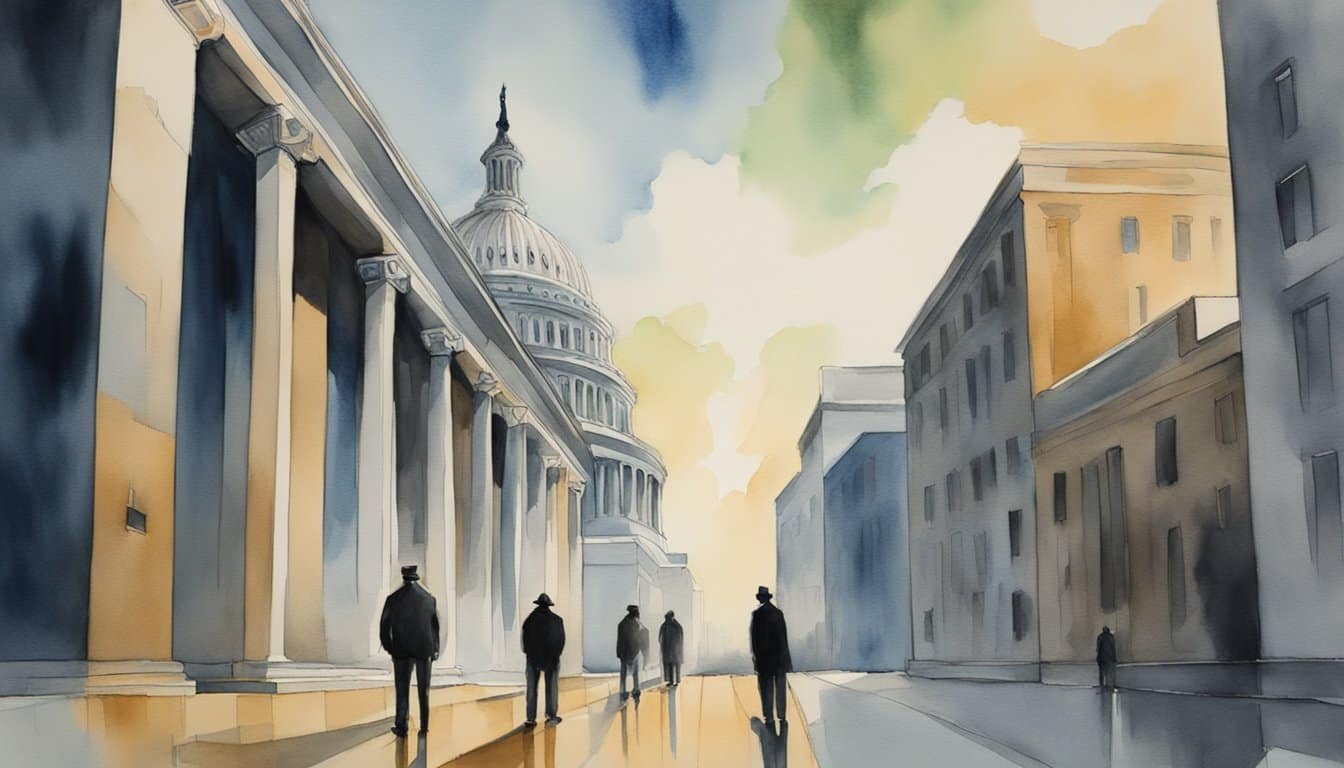Concept and Origins
In exploring the shadowy realms of power, the notion of a “deep state” intrigues and mystifies. It’s where unseen forces are believed to pull the strings that shape national policy.
Defining the Deep State
The term “deep state” refers to a body within a government that operates independently and covertly, often in pursuit of its own agenda. This entity is thought to consist of influential members of government agencies or the military, typically those with strategic information or resources that allow them to exert considerable power behind the scenes. It is often linked with the idea that these actors can direct policies and decisions made by the officially elected government, contrary to the will of the electorate.
Historical Etymology
The etymology of “deep state” originates from the Turkish term “derin devlet,” which describes a similar clandestine network believed to have existed within the Turkish government. This concept extends far beyond Turkey, with historical examples suggesting that various forms state within a state have seemingly operated with a degree of autonomy, often linked to the intelligence community or secret societies. These arrangements hint at an enduring presence within the structures of governance, predating modern states. Understanding the deep state requires looking at the subtle emergence of these entities.
Perception in American Politics
In American politics, “deep state” often surfaces within conspiracy theories that suggest a powerful group undermining and controlling government actions, a concept thrust into the mainstream by political rhetoric and commentary. However, it’s not an official or widely acknowledged term within the intelligence community or federal government. Instead, it conveys a perceived struggle for power between visible leaders and the alleged, secretive brokers who influence decisions from the shadows. The concept has evolved to encapsulate concerns over the integrity and transparency of governance, particularly with respect to the national security apparatus and its potential to impact democratic processes.
Allegations and Influences
When discussing the concept of the deep state, one enters a world where the lines between conspiracy theories and alleged political maneuvers blur. This section looks at how these allegations come to life and the various ways they shape public discourse.
Conspiracy Theories in the U.S.
American political discourse often finds itself intertwined with theories that suggest there are hidden forces within the government, like the CIA or other entities, exerting control beyond the elected officials. One notable mention in recent years is the claim that a secretive collusion within the US administration, sometimes termed the “deep state,” is working against former President Trump. These narratives, ranging from alleged ties between Trump and Russia to the FBI’s role in investigating his campaign, show the intricate nature of deep state allegations.
Media’s Role and Public Perception
Media outlets on both sides of the political spectrum contribute to shaping the narrative around the deep state. While conservative outlets like Breitbart News frequently criticize the alleged deep state for undermining conservative policies, left-leaning platforms may dismiss such notions as unfounded conspiracy theories. Reports about leaks and media influences play a significant role in swaying public opinion on matters like foreign policy and government transparency.
Global Perspectives
The deep state is not a concept exclusive to the United States. Globally, countries grapple with allegations of entrenched networks exerting undue influence over politics and policies, often with military involvement. Instances of deep state operations have been noted in nations like Turkey, where the term originated, implying a complex web of relationships among government officials, the military, and other power players. These influence claims span from local policies to broad foreign policy decisions, showing a pattern of suspicion and critique of authority worldwide.
Impact and Criticism

Diving into the heated discussions on the deep state brings up significant scrutiny on its perceived influence on government policies and assertions of an undemocratic shadow government.
Government Policies and Overreach
The term “deep state” implies a group within the government that operates outside the democratic process and can significantly influence or determine government policy. Accusations of overreach often focus on entities such as intelligence agencies and federal employees who are thought to possess the means to shape the political landscape. This includes manipulating policies contrary to the elected leadership’s agenda, as highlighted during the Trump administration.
Notable Criticisms of the Deep State Concept
Critics argue that the concept of a deep state is often wielded as a political tool, used to undermine opponents or dismiss the standard functioning of the bureaucracy. Figures like Steve Bannon, associated with the White House, have publicly criticized the influence of a so-called “deep state” or shadow government. Skeptics, however, question whether the label is just an oversimplified conspiracy theory, dismissing the expertise and professionalism within entities such as the executive branch.
Study and Analysis by Experts
Scholars and political commentators offer varying perspectives on the deep state. Michael J. Glennon’s book, The American deep state, for instance, delves into the intricate relationship between national security and governmental transparency. Other experts, like Mike Lofgren, who authored The Anatomy of the Deep State, scrutinize the network of defense contractors and federal employees for potentially influencing the democratic process without the consent of the governed, adding a dense layer of complexity to the understanding of state power.

